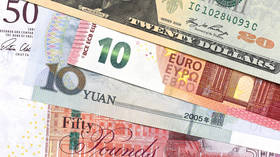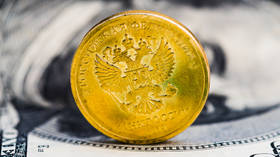Russian savers prefer yuan to euro and dollar – survey

The Chinese yuan is now the most popular foreign currency for savings among Russians, a survey conducted by the Public Opinion Foundation has revealed.
Respondents were asked to imagine that they were given a large amount of money in rubles on condition that they must convert it into a foreign currency of their choice and keep it in a savings account for five years. Roughly 32% of respondents favored the Chinese currency. The euro came in second with 26%, followed by the US dollar with 23%.
The yuan is the most popular currency among most age groups, except young people. Russians under 30 are more likely to choose euros (34%) or dollars (36%) for their rainy-day funds, while the yuan received only 32% of votes in this age group. The yuan is the first choice for 41% of Russians with university degrees.
The top five foreign currencies for savings also included the British pound (3%) and the Turkish lira (2%). Other responses included the Arab dirham, Swiss franc, Japanese yen (around 2% each), as well as the Israeli shekel and Iranian rial (1% each).
The majority of Russians (61%) prefer to keep their savings in rubles. Only 15% of respondents stated that they would pick a foreign currency instead of the ruble for their savings if given a choice.
The survey was conducted in late July among 1,500 respondents over the age of 18 across 104 Russian cities and rural settlements.
The survey also touched upon the ruble’s exchange rate, with half of the respondents saying they believe that the ruble’s strengthening against Western currencies benefits the Russian economy. They said it could help lower prices (9%) and improve the living standards of Russians (5%). Only 16% said that a weaker ruble is more beneficial for the economy.
Earlier this week, the Russian ruble dropped to a 16-month low of 101 against the dollar and 111 to the euro. It recovered some of the losses later in the week after the Bank of Russia hiked the key interest rate to 12%.
For more stories on economy & finance visit RT's business section













